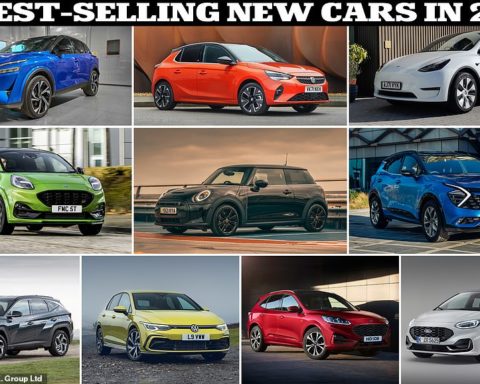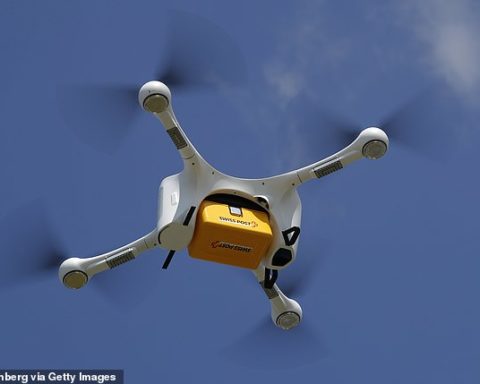The UK recorded its worst year for car sales in 30 years in 2022, official figures have confirmed.
Sales of 1.61million motors last year is the lowest since 1992, the Society of Motor Manufacturers and Traders said on Thursday.
It blamed a ‘very difficult year’ for the industry on supply shortages of semiconductor chips from locked-down China and other components from elsewhere, including Ukraine which spent most of 2022 at war with Russia.
However, there was some good news for the UK motor sector, with Nissan’s Qashqai crowned the UK’s best-selling car of last year – the first time a British-built vehicle has secured the top slot since 1998.
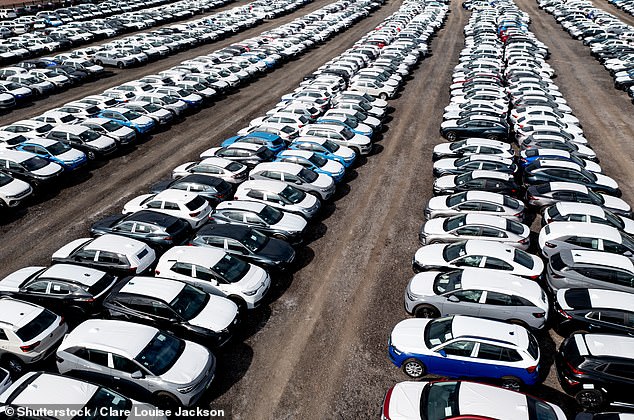
New car sales slip to a 30-year low: Just 1.61million motors were registered in the UK in 2022, which is the lowest volume since 1992, official records have confirmed today
The year-end figures from the SMMT revealed that 1.61million cars were sold in a ‘subdued’ 2022 – a 2 per cent fall on pandemic-afflicted 2021 as supply shortages continued to put a stranglehold on deliveries of new motors despite substantial consumer demand.
Total sales were around 700,000 cars fewer than were sold in pre-Covid 2019, when registrations exceeded 2.3million units.
But the UK did reclaim its position as Europe’s second biggest market overtaking arch-rival France to secure the runner-up slot behind Germany.
The SMMT warned that although the shortage of semiconductors is expected to ease as supply chains begin to stabilise, continued ‘erratic’ supply will likely impact manufacturing throughout 2023.
The most recent market outlook, published in October 2022, predicts around 1.8 million new car registrations in 2023, worth around £8.4billion in additional turnover.
The SMMT said: ‘Constrained supply saw many manufacturers prioritise deliveries of the latest zero emission capable models.’
Chief executive Mike Hawes described 2022 as ‘a very difficult year’ but highlighted signs that supply problems are ‘beginning to ease’.
He said: ‘Manufacturers have really struggled to be able to make the vehicles in sufficient quantities, primarily due to semiconductor shortages.
‘Lockdowns in China have not helped, high logistics costs, more pressure on raw materials.’
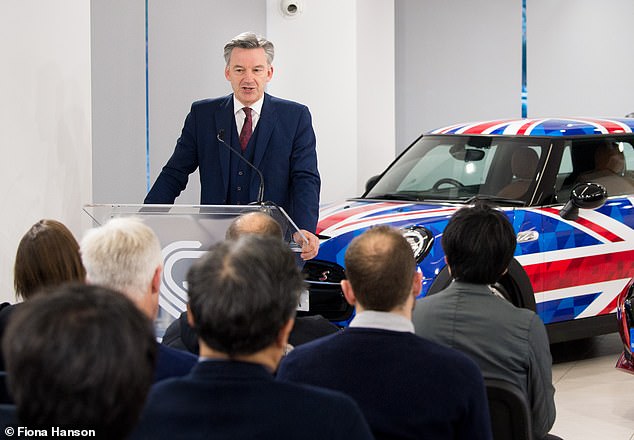
Mike Hawes, chief executive at the SMMT, said car makers have really struggled to be able to make the vehicles in sufficient quantities, ‘primarily due to semiconductor shortages’
Mr Hawes continued: ‘The automotive market remains adrift of its pre-pandemic performance but could well buck wider economic trends by delivering significant growth in 2023.
‘To secure that growth – which is increasingly zero emission growth – government must help all drivers go electric and compel others to invest more rapidly in nationwide charging infrastructure.’
He stressed: ‘Manufacturers’ innovation and commitment have helped EVs become the second most popular car type. However, for a nation aiming for electric mobility leadership, that must be matched with policies and investment that remove consumer uncertainty over switching, not least over where drivers can charge their vehicles.’
On the bright side, the SMMT said the UK new car market recorded its fifth consecutive month of growth in December, with an 18 per cent increase to reach approximately 128,000 new registrations.
But the SMMT noted: ‘This second half year performance was not enough, however, to offset the declines recorded during the first half of 2022.’
It has nevertheless put the UK on track for a predicted 15 per cent rise in sales this year – worth between £8.4billion and £10billion during 2023 – despite fears of a recession and an economic downturn, sector bosses added.
Commenting on the figures, Jim Holder, editorial director of consumer magazine What Car?, said: ‘Despite the strong performance for the second half of the year, 2022 finished behind 2021 and well below the pre-pandemic years, demonstrating just how detrimental the supply-side shortages and ongoing energy and cost of living crisis have been on the sector.’
‘Electric vehicle sales became the success story for the industry last year, outperforming diesel for the first time ever. The challenge for 2023 is maintaining that growth as the energy and cost of living crisis continues.’
Lisa Watson, sales director at Close Brothers Motor Finance, added: ‘Looking forward into 2023, vehicle suppliers should be better equipped to manage disruption and resource issues, which will help to alleviate the existing backlog of orders.
‘Recent growth should also help to cool the record high prices of second-hand cars.’
Chris Knight, UK automotive partner at accountants KPMG, said: ‘Despite the cost of living crisis, we enter the year with new car registrations on the up and one in five consumers with savings telling KPMG that they still plan on buying a vehicle in 2023’.
‘A further easing of global part shortages as the year progresses will continue to boost new car supply. The question remains how much a rising cost of living will impact demand in the longer term.’
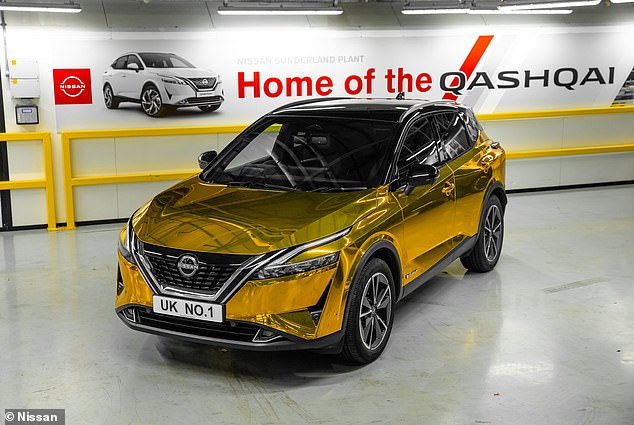
Nissan has celebrated the Qashqai officially becoming the UK’s most-sold new car by creating a gold-wrapped one-off special
Nissan Qashqai tops sales charts
The Sunderland-built Qashqai family crossover was the most popular car out of showrooms last year – even against a background of part-supply shortages and a cost of living crisis in the wake of the global Covid pandemic.
Priced from £26,045, more than 40,000 Qashqais were sold to UK customers.
It finished just ahead of the second-place Vauxhall Corsa, which was the best-seller of 2021.
A large festive-season shipment of pure electric Teslas to the UK – accounting for around one in eight of all car sales during last month – saw the Model Y catapult up the order to the third best-selling vehicle in 2022.
The US brand typically delivers a boat-full of new cars at the end of each quarter, however the number of Model Y vehicles arriving in December was enough to move it up from ninth in the sales charts at the end of November.
The influx of Tesla cars also propelled the proportion of overall electric vehicle sales for the month to a best-ever market share of around a third.
However, industry chiefs said this was ‘an anomaly’ with electric cars accounting for around one-in-six registrations for the year in full - which is projected to rise to a fifth of all new car sales in 2023.
It means electric car sales have for the first time exceeded those of diesel, and are second only to petrol.
Lack of charging infrastructure threatens EV uptake
Car bosses also warned that ministers risked stalling demand for electric cars – particularly among private buyers – unless it accelerated the roll-out of public charging points which are lagging behind plug-in vehicle sales.
They called for a ‘significant ratcheting up of investment’ in public charging infrastructure in light of the chaos seen at charging sites across the UK over the Christmas break, which resulted in some drivers waiting over three hours to plug their Teslas into a device.
Poor provision of charging points remains ‘a barrier’ to further EV uptake, said the SMMT noting: ‘The government’s EV Infrastructure Strategy forecast that the UK would require between 300,000 and 720,000 charge-points by 2030.
‘Meeting just the lower number would still require more than 100 new chargers to be installed every single day. The current rate is around 23 per day.’
It stressed: ‘Accelerated investment in charging infrastructure is needed if consumers are to be confident they can make the switch.’
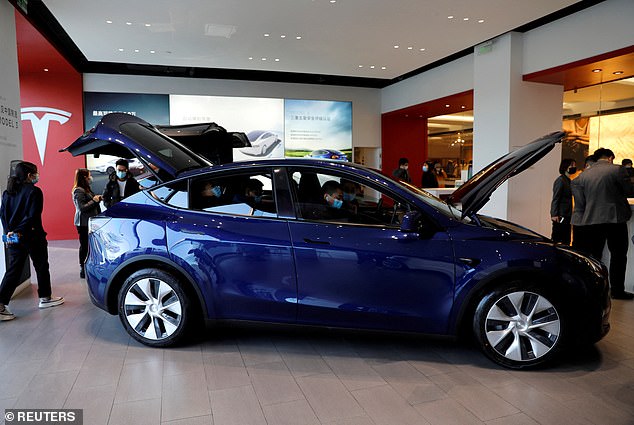
A large festive-season shipment of pure electric Teslas to the UK saw the Model Y (pictured) catapult up the order to the third best-selling vehicle in 2022
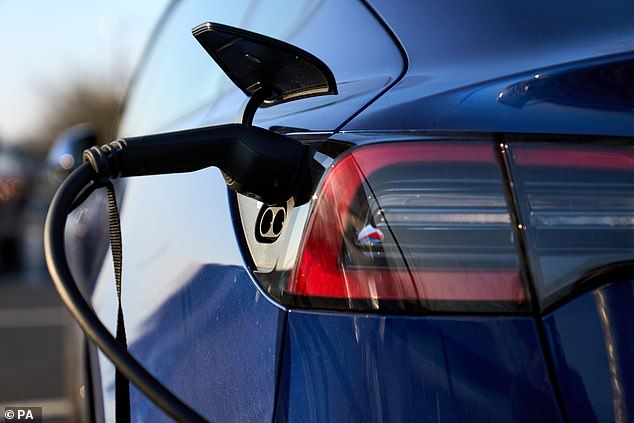
Industry bosses warned that despite a rising market share, the Government is threatening a future increase in sales of EVs by not investing enough in public charging infrastructure
All plug-in electric vehicles taken together accounted for more than one in five (22.8 per cent) of new registrations in 2022 – a new record high, although the rate of increase has been slowing, say car bosses (in 2020, the market share was 10.7 per cent and 2021 18.6 per cent).
As a result, average new car CO2 fell by 6.9 per cent to 111.4g/km – the lowest in history.
The SMMT noted that while private buyers accounted for more than half of all new car registrations, fleets and business buyers secured ‘the lion’s share’ of battery electric vehicles, accounting for two thirds (66.7 per cent) of all fully-electric registrations and three-quarters (74.7 per cent) of increased volume in 2022.
The government is to ban sales of new petrol and diesel cars and vans in the UK from 2030, but the SMMT did not believe potential chaos caused by too few charging-points would persuade ministers to put the brakes on their plans.
Manufacturers also face a Zero Emission Vehicle Mandate from 2024 - details of which have yet to be published by the government – which is likely to impose more constraints.
The trade body also warned that plans to introduce Vehicle Excise Duty (VED) on pure electric cars from 2025 - with the same ‘premium’ threshold as internal combustion-engine cars - could disproportionately penalise those moving to electric cars.
Some links in this article may be affiliate links. If you click on them we may earn a small commission. That helps us fund This Is Money, and keep it free to use. We do not write articles to promote products. We do not allow any commercial relationship to affect our editorial independence.


